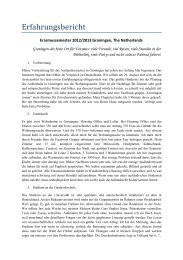Dariusz Aleksandrowicz Aleksandrowicz - Europa-Universität ...
Dariusz Aleksandrowicz Aleksandrowicz - Europa-Universität ...
Dariusz Aleksandrowicz Aleksandrowicz - Europa-Universität ...
Create successful ePaper yourself
Turn your PDF publications into a flip-book with our unique Google optimized e-Paper software.
The Socialist City and its Transformation<br />
I. Ideological foundations of a socialist city<br />
Unlike the development of new cities in Western industrial countries, the rise of socialist<br />
cities cannot be explained in terms of economic objectives and economic<br />
growth in the usual meaning of the word. The very rationality of the communist system<br />
was not an “economic” one but rested upon subordinating the latter to objectives<br />
which derived their justification from communist ideology. Achieving these ideology-defined<br />
tasks was due much more to political decision and political activity than<br />
to the organic development of the society and its infrastructure. The intention consisted<br />
rather in creating some new reality which would contradict the “spontaneous”<br />
(i. e. mainly economically determined) dynamics of the social organism. 1 Although<br />
the communist vocabulary contained words like “economic” or “economy”, what<br />
they referred to was, however, a politically manipulated system of production and<br />
distribution. 2 In the proper sense “economy” means the type of rules which govern<br />
production and distribution of goods. In Communism, on the contrary, the notion attributed<br />
to the specific content of what is being done (i. e., creating material goods),<br />
whereas the rules appropriate to it relied on political decision and ideological legitimization.<br />
Conceiving the city as the major scene where the communist utopia was to be realized<br />
in people’s every-day life, the Soviet-type Communists were in line with the<br />
mainstream of the tradition of utopianism. It was represented, for instance, by the<br />
“New Jerusalem” in the Apocalypse of John or by Campanella’s “The City of the<br />
Sun.” In accordance with this tradition they regarded the city as the expected surrounding<br />
where the new world resulting from a radical change would find its ex<br />
pression. 3 The ideology of the Soviet-type Communists differed here from their<br />
1 For the opposition of “spontaneous” and “constructed” order cf. Hayek (1978: ch. 6). With<br />
respect to the problems of a “socialist city” – cf. Szczepañski (1990; 1993a: 63p.). Contrasting<br />
“spontaneous” social order with the communist attempt to “construct” a society according to a<br />
general plan laid down by the superior political authority, we must, however, avoid possible misinterpretations.<br />
The communist idea of planning (or: planned economy) as a principle of social<br />
organization is not to be confused with planning (especially: urban planning) as a method of rationally<br />
managing and mutually adjusting particular aspects of a social organism. Since “planning”<br />
in the first meaning can be opposed to “spontaneity”, as Hayek understands the term, the<br />
proper opposite to “planning” in the other sense would be “anarchy”. For a related distinction<br />
between “utopian planning” and “social technology of particular problems” cf. Popper (1945: ch.<br />
9).<br />
2 The idea of opposing “production” and “economy” in order to finally release production of material<br />
goods from restrictions imposed upon them by economic rules traces back beyond Marx’<br />
“Critique of Political Economy” to the writings of Saint-Simon. For more cf. <strong>Aleksandrowicz</strong><br />
(1993: ch. XI) and Polanyi (1960).<br />
3 “From the architectural utopias of Alberti and Leonardo in the Renaissance, to Le Corbusier’s<br />
design for the ‘city of tomorrow,’ architects and urban planners have sought to realize the good

















